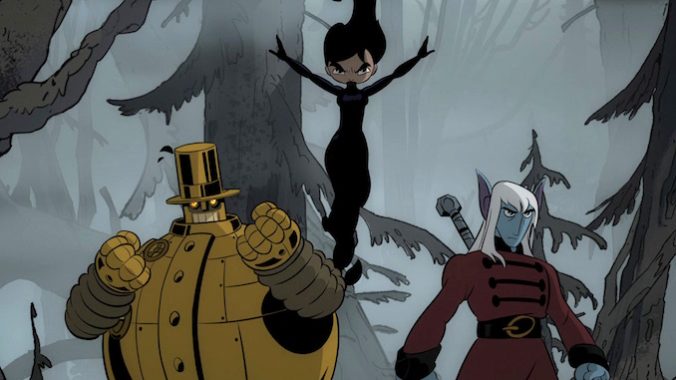Genndy Tartakovsky on Unicorn: Warriors Eternal’s Mythology, Love Triangles, & His 15-Year Journey to Get It Made
Photo Courtesy of Adult Swim
Genndy Tartakovsky’s long-gestating animated series, Unicorn: Warriors Eternal, finally made its debut at midnight on Adult Swim with two episodes, “The Awakening Parts I and II.” A time-jumping mystery with a unique mythology, the series introduces audiences to the Magic Order, a trio of reincarnating beings who exist to fight a recurring evil throughout the ages. As needed, the cosmic monk Seng, Elred the elf and sorceress Melinda are summoned to overtake new bodies throughout time by Copernicus, their steampunk styled robotic protector. But in 1890’s London, something goes very wrong with Melinda’s latest reawakening when her era’s host, Emma, rejects the takeover and all hell breaks loose.
In Part II of our Paste Magazine conversation with Tartakovsky, we dig into the specifics of Unicorn: Warriors Eternal’s development, the complex storytelling of the series and his hopes for the show’s longevity.
Note: This interview was lightly edited for length and clarity.

[Note: Spoilers below for the series premiere of Unicorn: Warriors Eternal]
Paste: Unicorn: Warriors Eternal is an idea you’ve been developing for 15-years. Did its origin come from a visual that came to you or was it born around the narrative of this group of immortal heroes saving the world throughout time?
Tartakovsky: It started off as usual with anything that I do, a visual image. It was a version of the team fighting a spectral train on fire. I wanted everything to be more magic themed, and so that was the beginning. As I started to develop it further through the years, it was really a metaphor for becoming teenagers. Having teenagers, you realize once they hit 13 or 14, it’s like a switch goes off, and they’re different people, right? So, it started out as the Industrial Revolution versus magic, and it grew to the duality of who we are. And it became much more about the characters, which I love because it made it that much more interesting. Especially with the character of Emma, because she’s obviously struggling the most with it. And that became the goal of it, for me. From that, it really was the wedding scene in the first episode, as one of the first things that I imagined, and I just wanted to see that.
-

-

-

-

-

-

-

-

-

-

-

-

-

-

-

-

-

-

-

-

-

-

-

-

-

-

-

-

-

-

-

-

-

-

-

-

-

-

-

-








































